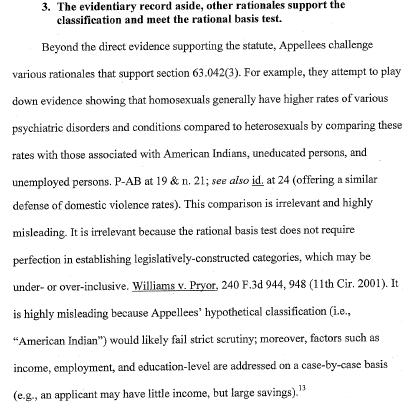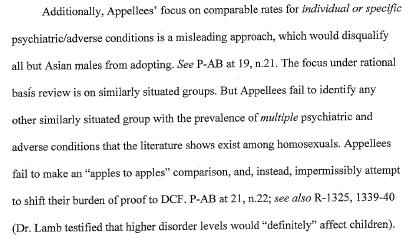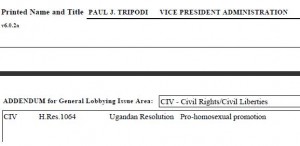I posted last week that Florida Attorney General and Republican candidate for Governor, Bill McCollum hired George Rekers as an expert in a gay adoption case over the advice of his staff. The state lost the case and the ban on gay adoption was set aside by Judge Cindy Lederman. Lederman took strong exception to Rekers’ work, saying that Rekers’ testimony “was far from a neutral and unbiased recitation of the relevant scientific evidence.” Despite the apparent harm the testimony did to the case, AG McCollum defended Rekers in a brief filed August 6, 2009 before a Florida state court of appeals seeking to overturn the lower court ruling. More specifically, McCollum defended Rekers’ religious writings and the evidence Rekers presented in defense of the ban on gays adopting children.
However, on one point McCollum contradicts his expert without acknowledging the contradiction. Rekers testified that one might exclude Native Americans from adopting if it could be shown that, as a group, they had higher rates of many distressing conditions. Here is Rekers’testimony:
Q. Well, Dr. Rekers, earlier you testified that Native-Americans have a higher rate of alcohol abuse than the general population does, right?
A. Yes.
Q. It’s a very significantly elevated rate of alcohol abuse, I mean compared to the general population?
A. Yes.
Q. So if Native-Americans have significantly higher rates of alcohol abuse, and if they also have significantly higher rates of psychiatric disorders, and if they also have higher rates of relationship instability, is that enough for you to say that all of a sudden they should be categorically excluded?
The Court: I think you can add violence to that, as well.
The Witness: Yeah, violence, yeah.
Q. And violence, as well.
A. Yeah, if it turned out that a majority of the individuals in the Native-American population, that a majority of them were high risk for one of these things happening, as a lifetime prevalence, there could be a parallel rationale for excluding them, as adoptive parents, because it would be not only them, they would tend to hang around each other. So the children would be around a lot of other Native-Americans, who are doing the same sorts of things, you know. So it would be a high risk, and, in fact, since you can’t perfectly predict human behavior, the best you can do and the best the State can do is to look at risk levels, and if a particular kind of household poses multiple high risks for condition that would be detrimental for children, then that would be a rationale for excluding that group.
Perhaps, with hindsight, Dr. Rekers would reconsider his testimony. However, there is no indication that it was ever amended or directly addressed by the state of Florida. However, here Rekers provides a rationale for excluding Native Americans along with homosexuals. The line of questioning seems as though it was designed to get Rekers to make some sort of distinction between sexual orientation and race. However, at least in this instance, he did not.
As I have looked into this, I have been puzzled about why Mr. McCollum would not dismiss his witness at that point or seek to distance himself from the testimony. I have also been puzzled about why Native American groups did not speak out when this was first repored in May. One representative of a Native American advocacy group, speaking on condition of anonymity said that such criticisms of Native Americans are made frequently and they do not take them seriously.
Perhaps one reason they do not take such arguments seriously is because such arguments would likely be dismissed in a real public debate or in a court proceeding. When arguing racial issues, courts take a more strict review of any governmental action to discriminate on the basis of race. Generally, on matters of race, if a government policy burdens an individual due to racial category, the government policy will not survive. AG McCollum argues in the 2009 appeal that the adoption case should be decided on a rational basis test. In this test, the government is generally given the benefit of the doubt in crafting laws when no fundamental rights or suspect classes are involved. McCollum argues and all agree that adoption is not a fundamental right and he also argues — and this is where the disagreement comes — that homosexuals are not a class worthy of the strict scrutiny test.
On page 8 of the appeal, McCollum discusses the matter of Native Americans and adoption.

McCollum here contradicts Rekers by saying that the category of Native American “would likely fail strict scrutiny.” This means the Florida legislature would have to have a much higher burden of proof as to why violation of the equal protection clause — e.g., excluding Native Americans — would serve a compelling state interest. What surprised me here, and perhaps it is because I am not a lawyer, is that the appeal narrative does not mention the testimony of Rekers in this section, even as Rekers is defended in the other sections of the appeal. Rekers clearly testified that the basis for exclusion in his opinion was the higher rates of distressing conditions. In the appeal, McCollum addresses the theory but does not address the fact that his own expert failed to make categorical distinctions.
The ways that some conservatives think about gays confuse me. On one hand, gays are considered a cohesive enough group with characteristics so common that they can be lumped together. When viewed this way, Rekers-style testimony is offered about the high rates of distressing problems and thus, how the entire group of people should be viewed negatively. However, on the other hand, some social conservatives do not consider homosexuals to be related enough to be a suspect class. Some go so far as to say there is no such thing as a homosexual, rather heterosexuals with homosexual behavior or problems.
McCollum then continues his argument that sexual orientation does not warrant a strict scrutiny standard.

McCollum here continues to argue that one distressing condition is not sufficient, or else only Asian males could adopt. However, McCollum wants the appeal court to know that the lower court did not demonstrate any other group like homosexuals, who have as many problems. Without acknowledging it, McCollum disagrees with his expert to further serve his case.
In this situation, I don’t think there is a fundamental right to adopt or be adopted so I am not sure how this case will turn out. However, a troubling thing here is the reasoning which invalidates individual rights due to membership in a particular group. It should make everyone a little nervous when individual gays are judged due to rates of distressing problems among larger groups of gays. Even on a practical level, such stereotyping can become the basis for predjudice and discrimination. Christians complain about this and we have freely chosen our beliefs. We don’t like it when such logic is used against us, and we should be very careful about where such thinking can lead.


